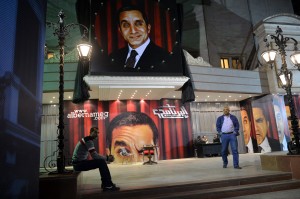
(AFP Photo)
The Investment Authority’s threat to revoke CBC’s licence if the satellite channel does not remove what it deems to be inappropriate content from the popular television programme Al-Bernameg has raised questions regarding the authority’s jurisdiction.
The incident provoked discussions regarding the process of licensing new satellite channels in the first place. Emad Mubarak, lawyer and director of the Association for Freedom of Thought and Expression (AFTE), stated that licensing channels is acquired through seeking the Investment Authority and the Egyptian Media Production City’s (EMPC) administration’s approval.
According to the Investment Law for Guarantees and Motivations, the Investment Authority is tasked with granting satellite stations licences alongside the EMPC. Satellite channels are considered a form of investment. The Investment Authority gives them bonuses to boost investment.
The Investment Authority gives channels a licence based on a contract, Mubarak said. Then, it has the right to monitor the channel’s commitment to the contract. If the channel breaches any of the points of agreement in the contract, the Investment Authority is entitled to issue the channel an ultimatum.
Upon its establishment, independent news channel ONTV licenced itself with the Investment Authority as a cultural channel. “Thus, when ONTV hosted a news-bar on its screen, the Investment Authority was entitled to issue a warning regarding the news-bar, which it did,” Mubarak said.
Mubarak stated that the Ministry of Information is not related whatsoever to the process of issuing licences to satellite channels. “It could however influence licencing decisions through indirect pressure,” Mubarak said.
In March, Minister of Information Salah Abdel Maqsoud cancelled the freeze on licencing new satellite channels. The freeze was issued in September 2011 by the former Prime Minister Essam Sharaf and the Supreme Council of the Armed Forces (SCAF).
In an earlier interview, Chairman of the Media Free Zone Abdel Moneim Al-Alfy stated that out of the 700 channels hosted on the Nilesat satellite, only 100 are properly licensed. He added that seven companies were granted a licence to launch channels after the 25 January Revolution, including the company which launched the CBC channel. Al-Alfy stated that five other companies were granted approval to broadcast on Nilesat without being given a licence.
“The problem with the CBC crisis is that the Investment Authority’s threat came out of its jurisdiction,” Mubarak said. He stated that while the Investment Authority is entitled to give channels ultimatums based on the nature of their content, it is not allowed to censure this content based on ethical or even legal matters. The latter is only within the judiciary authorities’ jurisdiction.
“The Investment Authority isn’t allowed to close down the CBC because it’s mocking the president,” Mubarak said. He said that this ultimatum opens the door for further acts of oppression. “The authorities have discovered that they can use the Investment Authority to crack down on media outlets instead of seeking court verdicts.”
Under the former regime, religious channels on Nilesat attracted criticism for broadcasting what some saw as hate speech. In October 2010 the broadcast licenses of 12 religious TV channels were suspended and 20 others were issued with warnings for “inciting religious hatred”. International satellite providers such as French Eutelsat reported the Al-Rahma channel for its anti-Semitic content.
This behaviour, Mubarak stated, reflects the state’s remaining control over independent media through abusing government bodies. He added that the solution lies in establishing an independent authority solely tasked with issuing licences.
“Yet, it is feared that the administration of such an independent authority would be appointed by the president,” Mubarak said. “If this is the case, then it will be even worse than the current situation.”




